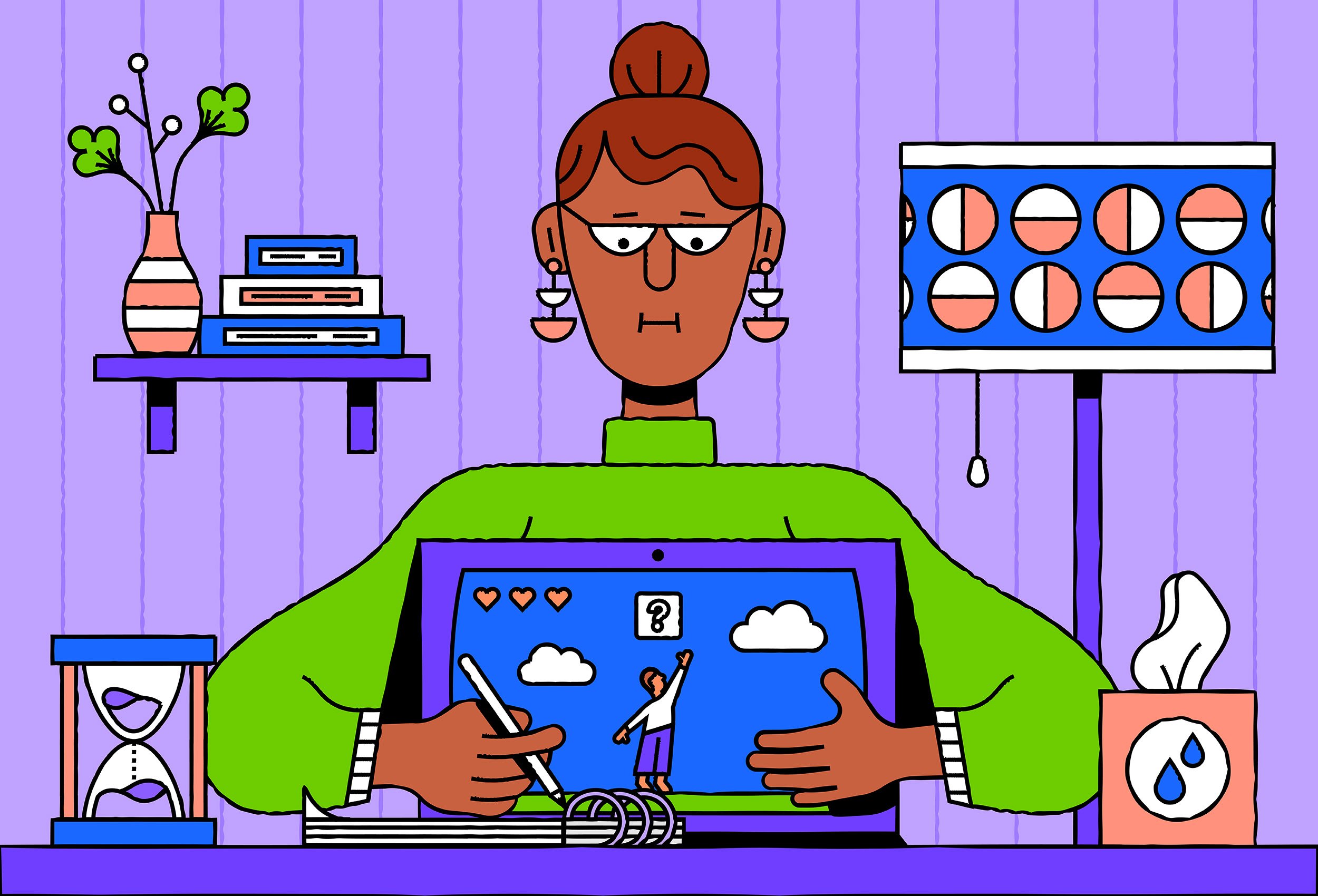Cozy gaming: the meditation practice for people who hate meditating
by Emily Blackwood
“Cozy” games are designed to promote relaxation. Illustration by Amy Lauren. Our nonprofit generates funding in multiple ways, including through affiliate linking. When you purchase something through an affiliate link on this site, the price will be the same for you as always, but we may receive a small percentage of the cost.
For many of us (present company included), meditating can be more of a stress inducer than a stress reliever. Between the uncomfortable positioning, the equally uncomfortable silence, and the sometimes terrifying experience of being left alone with your thoughts, the obstacles to enlightenment are often daunting for many.
But boy, do the benefits make you want to keep trying. Science is continuously giving us new reasons to meditate. Daily practice can improve mood, focus, emotional regulation, and memory, as well as reduce stress and anxiety. That last perk has always been particularly tempting for me, seeing as how our world offers a nonstop stream of stressors. To sit still and stay quiet, however, has made accessing any kind of stress relief via mediation impossible for me.
Or so I thought. As it turns out, there may be another way to reach that coveted state of internal peace, a way that is bound to be far less intimidating for some than traditional meditation: cozy gaming.
Cozy gaming can offer a more accessible method of achieving some of the same benefits of meditation.
Illustration by Amy Lauren
What are cozy games?
Unlike your standard shooter and adventure games, “cozy” games are designed to promote relaxation. They're low-stakes, no-pressure activities like tending to a virtual garden or putting together a digital puzzle. And they're not just fun to play — the calming themes and slow pace of these casual games have been shown to reduce stress as much as meditation under certain circumstances.
A 2021 study compared the stress levels of undergraduate students who played Flower — a game where the user acts as the wind and guides a flower petal through the air — to those who underwent a mindfulness meditation session. Results showed that participants in both groups had a significant reduction in physiological markers of stress (like heart rate and blood pressure). Professor Michael Wong, Ph.D., who authored the study, says that Flower’s calming music, nature theme, easy learning curve, and light level of difficulty are what contributed to the stress reduction.
“Casual video games reduce stress based on more of a ‘distraction-type’ strategy,” he theorizes. “In other words, participants felt more relieved, possibly because they were so focused on the gameplay rather than on stressors related to, for example, upcoming tests or exams. Meditation, on the other hand, may allow someone to really focus on calming internal stress-related thoughts.”
Dr. Kelli Dunlap, a clinical psychologist, game designer, and community director at the gaming and mental health nonprofit Take This, attributes the similarity of the two practices to the quiet focus they both encourage. "Think about PowerWash Simulator," she says. "It's incredibly simple — I mean, it's super deep and complex if you look at how the game actually works — but on the surface, you do something, and the world responds. You focus your effort, and then you see change. That can be therapeutic, de-escalating, and de-stressing."
Like Dr. Dunlap, licensed clinical depth psychologist and CEO of Geek Therapeutics, Dr. Anthony Bean frequently uses video games in his work with patients. He says that by giving themselves a moment to engage in an activity that brings them peace and a sense of accomplishment, his patients often experience increased self-esteem and self-awareness. Tapping into the quiet focus that mediation encourages provides a virtual sanctuary where you can be present and let go of all your worries.
"We're so primed as a culture to just go," says Dr. Bean. "But when we have a set amount of time — 15 or 20 minutes to do what we want, and then get back to the chaos — that's where a lot of our better functioning comes in. Games give that boost of self-esteem that work doesn't always offer. Those games are there to help us de-stress and relax a little bit. It's a quick moment of reprieve."
Beyond the need to take a minute for ourselves every now and then, cozy games invite in another aspect of mental health that's often ignored: play.
We need play
“Finding games based on what you need can be a powerful form of self-care.” Illustration by Amy Lauren
It isn't a concept associated with well-being enough, but Dr. Dunlap insists that play is essential to being human. "I don't think you can undersell the importance of play when it comes to mental health," she says. "Doing something that you are enjoying is inherently stress-reducing. You can't be in a state of positive feelings and stress. They're two opposite systems of the body. So if one is activated, the other is not."
For many people (again, present company included), self-care can easily become another box to check off. We engage in activities like meditation because they're supposed to be good for us. But if we're not enjoying them, wouldn't it be worth it to seek out something more fun?
Dr. Dunlap says yes. And while cultivating a virtual farm in Stardew Valley can be the calming salve we need during overwhelming times, some moments may call for games with a little more stimulation, like Call of Duty.
"Blowing things up can be very cathartic," Dr. Dunlap says, adding that by promoting the wide variety of games available, we can help destigmatize the medium and make it more accessible to everyone. "You're not only expanding the palette in terms of what gamers are already playing, but you open up the opportunity for people who may not traditionally be gamers to get the therapeutic support that play brings us."
Games can be a virtual portal to access whatever it is you're not getting in the physical world.
Be it a moment of peace, a social support network, or a safe avenue to let out some anger, finding games based on what you need can be a powerful form of self-care. I'm definitely in the "needing a moment of peace" category, so I downloaded a couple of top-rated cozy games to my iPhone and gave them a try.
Dr. Dunlap and Dr. Bean both expressed the importance of finding a game that appeals to you. So as an avid puzzler, I wasn't surprised that I was immediately drawn to Art Puzzle, a digital puzzle and coloring book combo that allows you to fill in the missing pieces of an artistic illustration. It's calming, has pretty pictures, and is a great way to unwind the overwhelm during inevitable moments of writer's block.
If you want some other, more professional recommendations, Dr. Dunlap says she's a fan of the Ace Attorney series and uses the game Adventures with Anxiety a lot in her practice. Dr. Bean has Blob Hero and Gun & Dungeons downloaded on his phone for a quick moment of fun.
At the end of the day, it doesn't matter what self-soothing practice you seek out — what matters is that it's something you enjoy.
Amy Lauren
You may also like:





